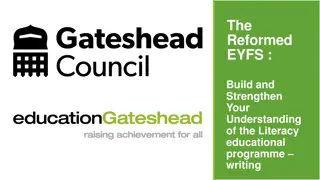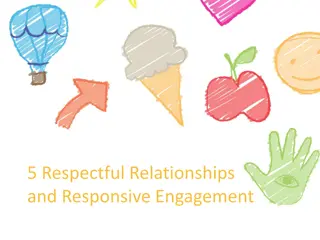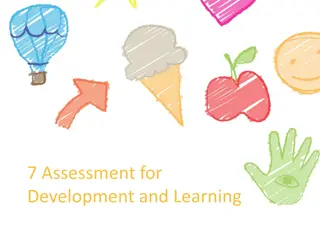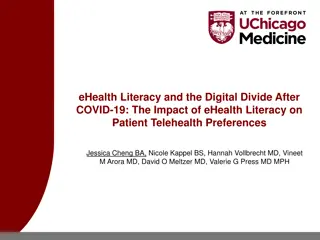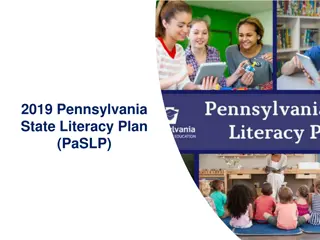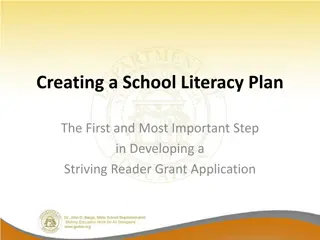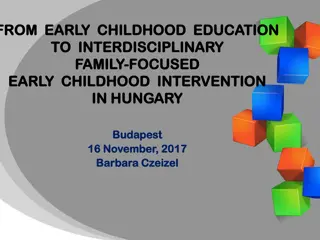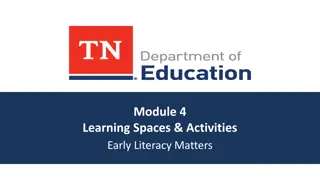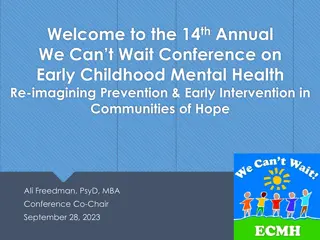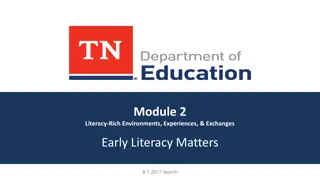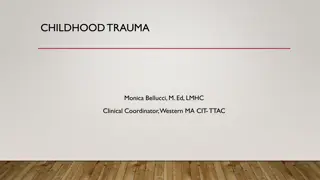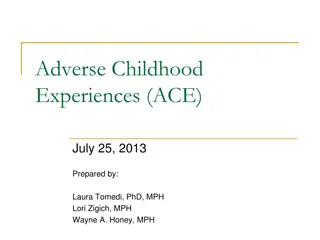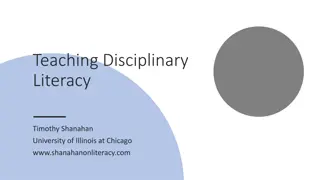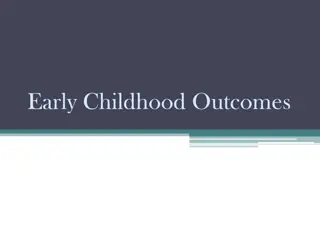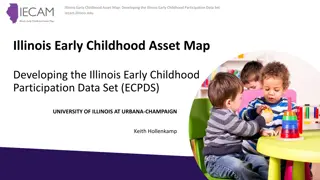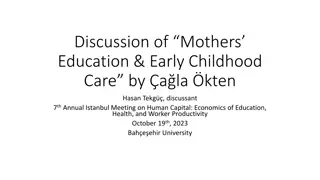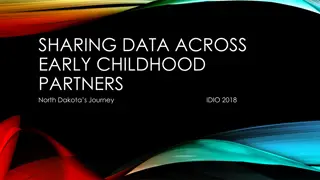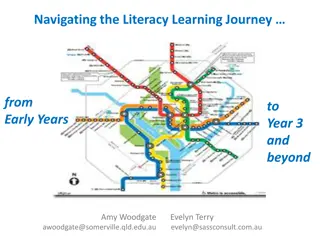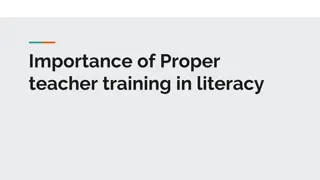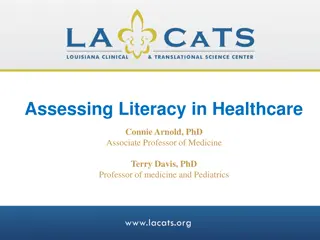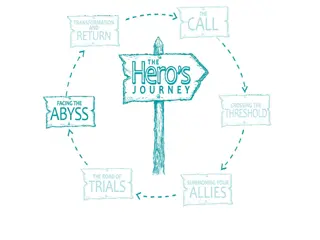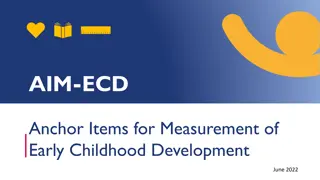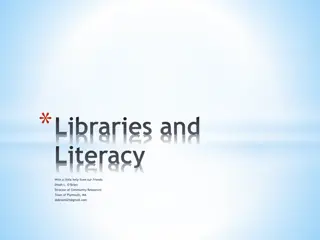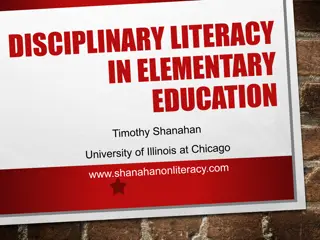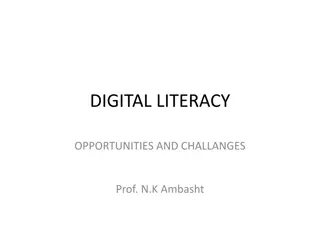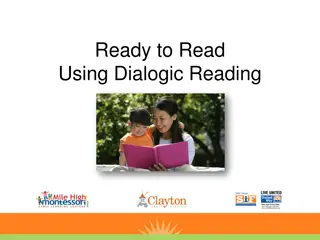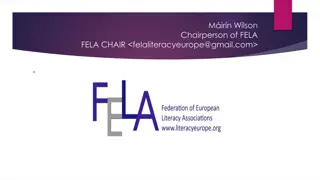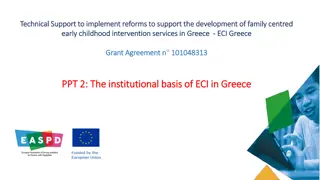Early Childhood Jobs -The Sector
Are you in search of rewarding positions in early childhood jobs in Australia? Look no further than The Sector Jobs, a dedicated job board exclusively for the early learning and child care sector. \/\/thesector.com.au\/early-childhood-jobs\n#early_childhood_jobs
0 views • 16 slides
Understanding the Reformed EYFS Literacy Programme
Deepen your knowledge of the reformed EYFS literacy programme with a focus on writing to support children's development. Explore changes to the statutory framework effective from September 2021 and the importance of literacy in early childhood education. Learn about transcription, comprehension, and
9 views • 81 slides
Enhancing Early Childhood Education for Improved School Outcomes
Focusing on the significance of early childhood education, this review emphasizes key recommendations for action to enhance school outcomes. Highlighted areas include the importance of making recent reforms permanent, the benefits of two years of early childhood education, the impact of starting sch
2 views • 12 slides
Literacy Coaches and Reading Specialists Program Overview
The Literacy Coaches and Reading Specialists Program, led by the California Department of Education, aims to enhance literacy outcomes for students. The program covers key aspects such as allocations, educator training, community building, and funding distribution to local educational agencies. The
2 views • 38 slides
Early childhood education jobs
Are you interested in working in the early childhood education sector Perhaps you have a passion for working with children, or are seeking a career change and want to explore the job opportunities available in your local area. \/\/thesector.com.au\/early-childhood-education-jobs
0 views • 16 slides
Health Literacy in Rural Appalachia: Understanding the Impact and Needs
Health literacy is crucial in rural Appalachia where low literacy levels contribute to poor health outcomes. Understanding, supporting, and improving health literacy among the population can lead to better health decisions and reduced disparities in healthcare access and outcomes. This article explo
0 views • 16 slides
Building Respectful Relationships and Responsive Engagement in Early Childhood
Responsive engagement in early childhood education involves building respectful relationships with children and families, emphasizing their strengths and interests. Two case studies highlight the importance of being attuned to children's needs and promoting positive relationships between parents and
0 views • 20 slides
Understanding Assessment for Early Childhood Professionals
Assessment for development and learning in early childhood involves gathering and analyzing information about children's knowledge, skills, and understanding. Early childhood professionals use a variety of tools and approaches to assess children's progress, readiness, and support needs. They value f
0 views • 39 slides
Understanding the Impact of eHealth Literacy on Telehealth Preferences Post-COVID-19
The research explores the relationship between eHealth literacy and patient telehealth preferences after the COVID-19 pandemic. It highlights disparities in telehealth use among different demographics, emphasizing the importance of digital literacy for accessing healthcare services. The study aims t
0 views • 19 slides
Pennsylvania State Literacy Plan (PaSLP) Overview
Pennsylvania State Literacy Plan (PaSLP) aims to improve literacy learning outcomes by providing districts and charter schools with guidance and tools to develop local literacy plans, facilitate data-driven decision-making, and create 21st-century classrooms. The plan underscores key guiding princip
2 views • 26 slides
Literacy Coaches and Reading Specialists Program Overview
State Superintendent of Public Instruction Tony Thurmond provided opening remarks at the December 5, 2022 webinar on the Literacy Coaches and Reading Specialists Program. The session covered program details, allocations, allowed expenditures, and additional supports. Participants engaged in a poll o
0 views • 44 slides
Developing a Comprehensive School Literacy Plan
Creating a school literacy plan is crucial for student success. Each school should have its unique plan, while districts can also develop one to support their schools effectively. The goal is to provide gold-standard literacy instruction, preparing students for college and career readiness. A synthe
2 views • 21 slides
Evolution of Early Childhood Intervention in Hungary
Early childhood intervention in Hungary has evolved from an emphasis on early childhood education towards an interdisciplinary, family-focused approach. The sectors involved include healthcare, education, welfare, and family affairs. A wide range of professionals, including health visitors, physicia
0 views • 10 slides
National Conference on Early Childhood Data Systems
The National Conference on Early Childhood Data Systems focused on federal investments in developing state-level data systems for early childhood education. The event covered the importance of integrated data systems, challenges, and opportunities for researchers. It highlighted the roles of differe
0 views • 29 slides
Enhancing Early Literacy Skills through Learning Spaces and Activities
Explore Module 4 focusing on creating book-and-language rich learning environments for children to develop essential literacy skills. Discover strategies for modeling and practicing early language and literacy skills, and learn how to design learning spaces to promote conceptual knowledge. Aligns wi
0 views • 17 slides
14th Annual We Can't Wait Conference on Early Childhood Mental Health
The 14th Annual We Can't Wait Conference on Early Childhood Mental Health focuses on re-imagining prevention and early intervention in communities of hope. The conference includes valuable sessions, networking opportunities, and acknowledgments of significant contributors in the field. Attendees can
0 views • 12 slides
Module 2: Literacy-Rich Environments and Experiences for Early Literacy Development
In Module 2, you will explore the importance of creating literacy-rich environments for young children to enhance language development. Reflect on positive interactions, intentional planning, and ways to engage children in meaningful literacy activities. Discover how classroom arrangements and mater
0 views • 14 slides
Master's in Language & Literacy: Trademark Outcome and Alignment with ILA Standards
The Language & Literacy Master's specialization aims to equip students with essential skills to become literacy leaders through in-depth knowledge and practical application of literacy methods. The program emphasizes the importance of sustaining professional collaboration and improving diverse learn
0 views • 17 slides
Understanding Childhood Trauma and Its Impact on Development
Explore the complexities of childhood trauma with Monica Bellucci, M.Ed., LMHC, as she delves into the identification of trauma, adverse childhood experiences (ACEs), types of abuse, and the effects on brain development. Gain insights on trauma-informed approaches and the importance of early interve
0 views • 33 slides
Understanding Adverse Childhood Experiences (ACE) Study and Findings
The Adverse Childhood Experiences (ACE) Study conducted by CDC and Kaiser Permanente examines the impact of childhood trauma on health outcomes. It defines and discusses various ACE factors like abuse, neglect, and household dysfunction. The study reveals that such experiences in childhood can signi
0 views • 30 slides
The Significance of Visual Literacy in Today's World
Visual literacy is increasingly crucial in our modern society, with children learning and communicating through images. Understanding the hidden messages in visual content is vital for effective communication and learning. As technology evolves, the connection between visuals and knowledge becomes m
0 views • 21 slides
Understanding Content Area Literacy vs. Disciplinary Literacy
Content area literacy focuses on improving reading comprehension and study skills across disciplines, while disciplinary literacy delves into discipline-specific ways of using text to create and evaluate knowledge. Expert reader studies and the specialization of literacy further highlight the nuance
0 views • 56 slides
Understanding Early Childhood Outcomes and COSFs
Early Childhood Outcomes (ECOs) and Childhood Outcome Summary Forms (COSFs) are essential evaluations mandated by the Office of Special Education Programs. COSFs are completed for children aged birth to six who receive special education services, focusing on social-emotional skills, knowledge acquis
0 views • 56 slides
Developing the Illinois Early Childhood Participation Data Set
The Illinois Early Childhood Asset Map project aims to develop the Illinois Early Childhood Participation Data Set (ECPDS) in collaboration with various organizations and agencies, including the University of Illinois, Chapin Hall, Northern Illinois University, ISBE, IDHS, and ILDS. This initiative
0 views • 7 slides
Importance of Mothers in Early Childhood Education
Mothers play a crucial role in early childhood education, especially in developing countries where many children lack access to formal education. Studies show a strong link between a mother's education level and the time she invests in her child's learning. By examining a 1997 education reform, rese
0 views • 8 slides
Enhancing Developmental Screening and Referral Systems for North Dakota's Early Childhood Partners
North Dakota's journey in sharing data across early childhood partners involves various agencies such as the Department of Health, Public Instruction, Human Services, and more. Spearheaded by Prevent Child Abuse North Dakota (PCAND), initiatives like the Early Childhood Comprehensive System (ECCS) a
1 views • 9 slides
Navigating Literacy Learning Journey: Early Years to Year 3 & Beyond
Explore the essential skills required for literacy development from early years to year 3 and beyond, focusing on print-based and language-based core literacy skills, functional literacy conventions of writing, and the oral and written language scales. Address challenges in consolidating spelling an
0 views • 13 slides
Importance of Proper Teacher Training in Literacy: The Science Behind Reading
Effective literacy training for teachers is crucial for improving reading scores, especially among disadvantaged students. Research shows that with evidence-based strategies, 95% of children can learn to read. It is essential to teach reading explicitly and systematically, emphasizing skills like de
0 views • 13 slides
Understanding Patient Literacy in Healthcare
Assessing literacy in healthcare is crucial as it can be a barrier for patients in understanding medical instructions and information. Patient literacy is not always apparent, and formal assessments are needed to measure health literacy accurately. Using tests like REALM, TOFHLA, and NVS can help he
0 views • 39 slides
Developing Literacy Skills for Leadership Excellence
Enhance your speaking, reading, and writing abilities through a comprehensive program designed to transform your literacy skills. Join Teaching Leaders Residential in August 2015 led by Geoff Barton to uncover the secrets of literacy and improve your communication techniques. Explore essential topic
0 views • 89 slides
Understanding AIM-ECD: An Innovative Tool for Early Childhood Development Measurement
AIM-ECD is a comprehensive tool designed for measuring early childhood development, consisting of Child Direct Assessment (DA) and Caregiver Report (CR). It covers key domains like Early Literacy, Early Numeracy, Executive Functioning, and Social-Emotional skills. Implemented in various countries, A
0 views • 11 slides
Financial Literacy and Education Commission: Coordinating Federal Efforts
Financial capability empowers individuals to manage financial resources effectively, make informed choices, avoid pitfalls, and improve their financial well-being. The Financial Literacy and Education Commission (FLEC) works to improve the financial literacy of individuals in the United States throu
0 views • 16 slides
Empowering Communities Through Libraries and Literacy Advocacy
Education is fundamental for societal progress, and libraries play a crucial role in promoting literacy and knowledge dissemination. They serve as historical archives, educational hubs, and inclusive spaces for adult learners. The integration of literacy into library services enhances community outr
0 views • 6 slides
Exploring Disciplinary Literacy in Education
Educators have long emphasized the importance of content area reading to improve students' comprehension and study skills across various subjects. However, disciplinary literacy goes beyond basic reading skills, focusing on how different disciplines create, communicate, and evaluate knowledge throug
0 views • 42 slides
Exploring Digital Literacy: Opportunities and Challenges in Education
Explore the realm of digital literacy with a focus on adult education, functionality in changing times, and the impact on citizenship and economic development. Discover the intrinsic connection between literacy, language, and script, and how digital platforms are expanding knowledge sources. Delve i
0 views • 9 slides
Understanding Financial Literacy and Its Importance
Financial literacy is crucial in today's society as it involves knowledge of financial concepts, skills to make effective decisions, and confidence in financial matters. This module explores the definition of financial literacy, its importance for young people, and the impact of financial literacy a
0 views • 20 slides
Understanding Literacy Beyond Traditional Approaches
Explore the expanded concept of literacy beyond traditional school methods like reading and writing, delving into emotional, social, and physical aspects. Discover how everyday experiences contribute to literacy development and its connection to language, culture, and background. Follow the story of
0 views • 21 slides
Understanding Dialogic Reading for Early Childhood Literacy
Dialogic reading is a valuable tool to engage young children in reading, fostering literacy skills crucial for school readiness. Through interactive conversations about picture books, children become active participants in the reading process, enhancing their vocabulary, comprehension, and love for
0 views • 17 slides
Promoting Literacy Excellence in Europe: FELA's Commitment and Initiatives
FELA, chaired by Mirn Wilson, brings together 30 literacy organizations across Europe to enhance professional skills, share best practices, and improve literacy at all levels. Through diverse experiences and collaborations, FELA members are dedicated to promoting literacy through research, policy de
0 views • 8 slides
Supporting Family-Centered Early Childhood Intervention Services in Greece
The grant agreement aims to implement reforms supporting the development of family-centered early childhood intervention services in Greece. It emphasizes the human rights and child rights framework, highlighting the legal and political basis of early childhood intervention in the country. The conte
0 views • 7 slides

